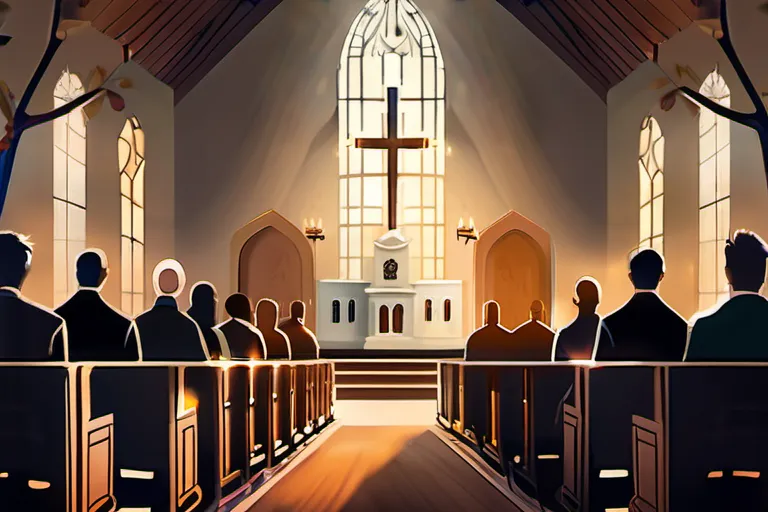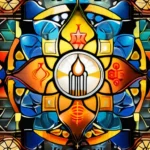Exploring the unique beliefs, practices, and impact of Brethren religion on global religious landscape
This article delves into the intricacies of Brethren religion, a significant yet often overlooked denomination within Christianity. We will explore its origins, core beliefs, practices, and the role it plays in the broader context of world religions.
The Origins and History of Brethren Religion
The origins of Brethren religion are like a river tracing its path from the Radicals and Pietists, who sought to return to the simplicity of the early Christian church. Imagine, if you will, a group of individuals yearning for authenticity in their faith—these were the pioneers of what would become known as Brethren religion.
From Radical Pietist roots, Brethren found their voice amidst the chaos and complexity of 18th-century European society. The movement was a reaction against the formalism and ritualistic practices that had dominated Christian churches for centuries. They emphasized personal piety, simplicity in worship, and the pursuit of holiness in daily life. This quest for purity and authenticity was like finding a clear spring in a murky landscape.
As these Brethren groups began to grow and spread, their influence became more pronounced. The Believers’ Church model, which held that only believers should be baptized and participate in communion, was at the heart of their distinct identity. This approach challenged the prevailing practices of the time, where infant baptism and outward adherence were common.
Their emphasis on a community of believers also set them apart. Brethren religion fostered tight-knit communities where members supported one another in both spiritual and practical ways. These communities often met in homes rather than designated church buildings, mirroring the early Christian practices and emphasizing the importance of personal faith over institutional structures.
Their history is a testament to the power of simplicity and authenticity in religious life. As Brethren religion spread across Europe and later to other parts of the world, it left an indelible mark on global religious landscapes. From its humble beginnings in the Radical Pietist movement, Brethren religion has evolved into a diverse and vibrant tradition with many different expressions today.
How did this small group of believers transform into a significant force in the world of religions? The answer lies in their unwavering commitment to simplicity, community, and personal faith. These are the elements that continue to define Brethren religion and make it a unique and compelling presence in the diverse tapestry of religious traditions.
Core Beliefs and Practices of Brethren Religion
The Core Beliefs and Practices of Brethren Religion are like the roots of a mighty tree, deeply embedded yet reaching out to nourish a diverse ecosystem. What are these beliefs that have grown into such a significant presence in the global religious landscape? Let’s delve into the heart of their faith.
At the core of Brethren religion lies the belief in the personal and direct experience with God. Unlike some religions, where doctrine can sometimes feel like a distant cloud, Brethren see God as intimately close, accessible through prayer and study. This belief is not just intellectual; it’s a lived reality, a daily encounter that shapes their lives.
Baptism, for the Brethren, is more than a ritual—it’s a declaration of faith. They believe in believer’s baptism, which means believers are baptized as adults after professing their faith. This act symbolizes a personal commitment to Christ and signifies new life in Him. It’s like lighting a flame that burns brightly, representing a transformation from darkness into light.
The practice of Communion (the Lord’s Supper) is another significant aspect. For the Brethren, this ritual is not just a memorial; it’s an ongoing and intimate presence of Christ among them. During communion, they come together to remember His sacrifice, sharing in His body and blood, embodying the unity of believers in His love.
The Bible holds a special place in Brethren religion, acting as both their guidebook and living voice. They believe in Scriptural integrity, viewing every word as inspired by God. This means they approach the Bible with reverence but also with an open heart, ready to interpret its teachings within the context of contemporary life.
In essence, Brethren religion is a tapestry woven from threads of personal faith, communal worship, and the living Word of God. These beliefs and practices not only shape their spiritual lives but also have a profound impact on how they engage with the world around them—building communities that reflect Christ’s love in tangible ways.
The Brethren Denomination within Christianity
The Brethren denomination within Christianity stands as a unique branch, often overshadowed by the vast and varied landscape of Christian denominations. Yet, its significance cannot be understated when considering the rich tapestry of world religions. How can we reconcile such an influential yet somewhat enigmatic group with the mainstream Christian sects? The answer lies in understanding their distinctive characteristics while recognizing commonalities that bind them to broader religious contexts.
One might wonder: What sets Brethren apart from other denominations, and why does this matter for our global religious dialogue? At its core, Brethren religion emphasizes simplicity and community. These values are not unique but are perhaps more prominently displayed in the Brethren’s daily lives. They believe in the direct experience of God through faith alone, much like many Protestant groups, yet their practices often involve a strong sense of communal responsibility. How does this emphasis on simplicity and community impact their religious rituals and everyday interactions?
Consider the metaphor of a river that branches into multiple streams. Each stream retains its distinct identity while flowing toward the same ocean. Similarly, Brethren religion can be seen as a significant tributary within the vast river of Christianity. Its unique teachings and practices offer a refreshing perspective on traditional Christian beliefs, enriching the global religious dialogue. The question then arises: How do these unique characteristics contribute to the broader understanding of Christian theology and practice?
Moreover, Brethren’s emphasis on peace and non-violence resonates across various world religions, providing a bridge for interfaith dialogue. Can we draw parallels between their teachings and other religious traditions that also advocate for non-violent solutions? The answer might just lie in recognizing the universal quest for spiritual fulfillment and social justice that transcends denominational boundaries.
In exploring Brethren’s place within Christianity, it becomes evident that this denomination plays a vital role not only within its own community but also as a voice of diversity within the Christian world. How does this role influence our understanding of religious pluralism? The answers to these questions offer a deeper insight into the complex and interconnected nature of global religions.
Brethren Religion’s Impact on Global Religious Landscape
Imagine a small boat navigating the vast ocean of global religions, and suddenly, you spot a unique vessel – that’s Brethren religion. While it may not be as widely recognized as some major world religions, its significance cannot be understated. How has this denomination managed to make such an impact on the global religious landscape?
The growth of Brethren religion is akin to a whisper that gradually transforms into a roar. Initially, it emerged in the early 19th century as a branch from other Christian denominations, seeking simplicity and authenticity in faith. But what sets it apart? Its emphasis on personal piety, community service, and separation from societal vices creates a distinct identity that resonates with many.
When we consider its distribution, Brethren religion is not confined to one region or country. Instead, it has spread like wildfire across continents, making homes in communities worldwide. This widespread presence highlights the adaptability of Brethren beliefs and practices, showing how they can thrive in diverse environments while maintaining their core values.
One of the most significant contributions of Brethren religion is its role in interfaith dialogue. Through active engagement with other religious groups, Brethren have fostered mutual understanding and respect. How does this compare to your own experiences? Have you ever engaged in such dialogues? Can you imagine a world where different faiths not only coexist but also enrich each other’s lives?
Through their dedication to charity work and community service, Brethren have exemplified the spirit of religious engagement beyond borders. Whether it’s building schools in developing countries or providing aid during natural disasters, these actions demonstrate a global perspective that goes beyond denominational boundaries.
Reflect on this impact—how does it inspire you? How can we learn from their example to bridge gaps between different religious communities? The journey of Brethren religion is not just about its existence but also about the lessons it offers for unity and cooperation in a diverse world.
The Role of Brethren Religion in Modern Society
The Role of Brethren Religion in Modern Society: Can we truly understand contemporary society without delving into the intricate web of its religious fabric? The Brethren religion, while often overlooked, plays a significant role in shaping social dynamics and cultural landscapes across the globe. How does this faith influence our daily lives, and what are the unique contributions it brings to the table?
One cannot ignore the social impact that Brethren religion has on communities worldwide. These believers advocate for simplicity and humility, often leading them to engage in community service and charitable work. Is it a coincidence that in many impoverished regions, Brethren organizations provide essential services such as healthcare, education, and disaster relief? The Brethren’s commitment to helping others is more than just a religious duty; it’s a way of life.
Moreover, the cultural aspects of Brethren religion are profound. Their festivals, traditions, and rituals offer a unique glimpse into their belief system. For instance, the observance of certain feast days, such as Fast Sunday, reflects their deep commitment to spiritual practices and communal bonding. These cultural expressions enrich the tapestry of global diversity, fostering a sense of shared human experience.
In the realm of politics, Brethren voices contribute to discussions on social justice and equality. With a strong emphasis on nonviolence and peace, they often take part in movements advocating for civil rights and democratic reforms. How do their values influence political discourse? Can we see a direct correlation between Brethren participation and positive changes in society?
The Brethren religion’s role in modern society is multifaceted, impacting everything from community service to cultural traditions and political activism. It challenges us to reflect on the importance of faith in shaping our world. In an ever-evolving global landscape, how will Brethren religion continue to evolve and contribute? The answers to these questions are not only crucial for understanding current dynamics but also for predicting future trends.
Future Prospects for Brethren Religion
As we look towards the future, one cannot help but wonder about the trajectory of Brethren religion. Will it continue to thrive in its current form, adapt to new challenges, or perhaps even transform into something unrecognizable? The landscape ahead is both exciting and unpredictable, filled with potential trends and unforeseen obstacles.
Technological advancements could be a double-edged sword for Brethren. On one hand, digital platforms offer unprecedented opportunities for outreach and engagement, potentially reaching communities that were previously out of reach. However, on the other hand, these same technologies can also dilute traditional practices if not used wisely. How will Brethren navigate this digital frontier while preserving their core beliefs and values?
Demographic changes pose another significant challenge. As populations shift, so too do cultural dynamics. Will Brethren religion continue to resonate with younger generations or will it face resistance in an increasingly secularized world? It’s a question of balance—how can Brethren maintain their unique identity while embracing the diverse perspectives that shape modern society?
Global events, from economic downturns to geopolitical conflicts, may also impact Brethren communities. These external factors can either strengthen solidarity or create divisions. For instance, how will Brethren respond during times of crisis? Will they unite in support of their fellow believers, or will internal disagreements undermine their collective strength?
The future of Brethren religion is far from certain. It could very well evolve into a more inclusive and adaptable faith, capable of navigating the complexities of the 21st century. Or it might face significant hurdles that test its resilience. Regardless of the path it takes, one thing is clear: Brethren religion will continue to play a vital role in shaping our world, whether through its contributions to social justice or its unwavering commitment to spiritual purity.
As we ponder these questions, let us remember that the future of any religion is ultimately shaped by those who practice it. The choices and actions of Brethren today will determine the shape of their faith tomorrow. How will they respond to change? Will they embrace it or resist it?
Conclusion
 By understanding the unique aspects of Brethren religion, we gain valuable insights into religious diversity and the rich tapestry of faith that makes up our global community.
By understanding the unique aspects of Brethren religion, we gain valuable insights into religious diversity and the rich tapestry of faith that makes up our global community.











